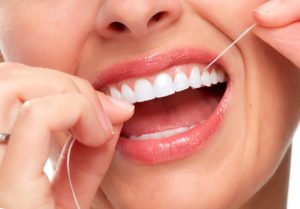Flossing V. Waterpiks
 You have seen or heard about waterpiks, and may be a bit confused. You’ve always been told to floss and may be wondering if waterpiks do the same thing. Flossing and waterpiks are two different tools that serve two different purposes when it comes to maintaining your oral health. However, both serve as an excellent complement to just merely brushing.
You have seen or heard about waterpiks, and may be a bit confused. You’ve always been told to floss and may be wondering if waterpiks do the same thing. Flossing and waterpiks are two different tools that serve two different purposes when it comes to maintaining your oral health. However, both serve as an excellent complement to just merely brushing.
Flossing, In A Nutshell
Dental floss has been around for over 200 years, if not longer – there are indications that it was even used in prehistoric times! A staple of oral hygiene, floss is easy to control and allows you to fully and properly clean each tooth. Flossing daily removes plaque. If plaque is not removed, it eventually hardens into tartar. Over time, tartar can cause a host of oral health problems, including gum disease.
What Are Waterpiks?
Waterpiks are great for removing food and debris from in between your teeth. They can be especially useful for those with orthodontic work, as they can clean underneath braces and wires. They are also recommended for those with fixed bridges, crowns, or dental implants. Waterpiks are easy to use and can help clean hard-to-reach areas inside your mouth. Using a waterpik can help clean periodontal pockets that lead to gum disease.
How Do Flossing And Waterpiks Differ?
Flossing can be considered more of a “wipe,” while waterpiks can be considered more of a “rinse.” Because of this, flossing is a significantly more effective way to remove plaque. Even though waterpiks may be marketed under the name “water flossers,” they are not effective as a standalone option to remove plaque.
Floss is also significantly cheaper than a waterpik. You can purchase different types of floss, but a pack of floss should not run you more than a few dollars. You can also purchase different types of waterpiks, with low-end models costing about $30.
When used together, the two tools can achieve great results. Flossing can scrape away and loosen plaque, which is typically sticky. A waterpik can then be used to rinse away the residue that was left behind. Doing so in unison can protect your mouth from gum disease and other health issues that arise when bacteria is left to fester in your mouth. It has always been recommended that you rinse after flossing. Doing so with a waterpik allows you to blast away every bit of plaque that you just removed from your teeth.